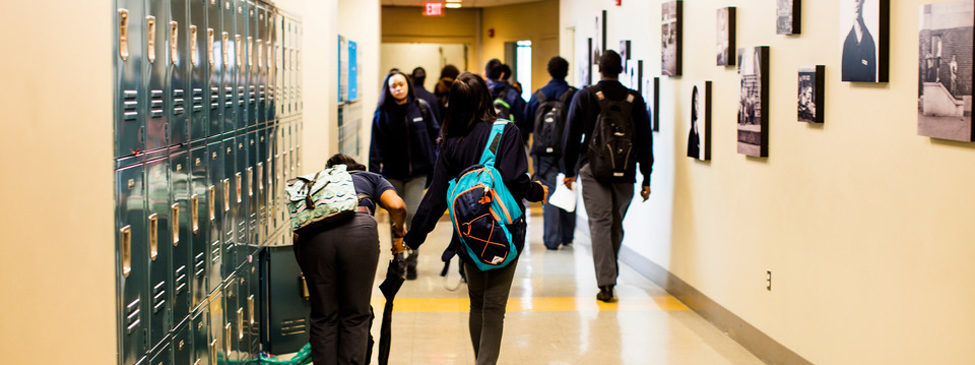Peggy McLeod is the Deputy Vice President of Education and Workforce Development at the National Council of La Raza (NCLR). NCLR is the largest Latino civil rights advocacy organization in the country; their work dates back to the 1960s. With almost 300 affiliate nonprofit member organizations across the U.S., NCLR is able to engage with Latino communities on local, regional, and national issues—including education policy. We sat down with Peggy to discuss how NCLR engages families and communities on education, and how they’ll put those strategies to use as states begin crafting their plans to implement the Every Student Succeeds Act (ESSA).
What are some of the ways NCLR advocates on behalf of families and communities when it comes to education?
Our mission is to provide opportunities for Latinos to improve their lives. When it comes to education, we do that by advocating for education policies in D.C. and at the state level that can benefit Latino families. We also run a number of programs to work directly with students, parents, school leaders, and community stakeholders to further our mission on the ground.
We’ve been involved in education policy for many years, and we are proud of the fact that we were able to fight for better accountability provisions in ESSA that will directly benefit communities of students we serve, like English language learners, for example.
Now that ESSA has passed, has NCLR adjusted its efforts to engage families and communities?
Our priority issue in terms of education advocacy is ensuring we have robust accountability plans at the state level. We intend to do that by adjusting two things we already do: work with school leaders on the ground in states, and develop the capacity of parents.
We’ve trained school leaders at the state level through our National Institute for Latino School Leaders (NISL). For a year they focus on federal advocacy, but in anticipation of ESSA, we made this year’s program two years long, and included a focus on state-level advocacy and how to make sure ESSA accountability plans are fair and include Latino voices.
Padres Comprometidos is an NCLR parent engagement program that connects parents to their children’s schools and helps them do things like talk to principals, effectively communicate with their children about school, and understand what they need to succeed in school. We’re not using this program to necessarily explain ESSA yet, but ESSA is touched upon in a new part of the program that explains to parents how education policy laws affect their children. We’re also going to hold bi-monthly webinars with parents across the country to provide them the expertise they need in order to participate meaningfully in community discussions about the accountability plans.
So far, have you seen parents starting to engage, or meet with groups within their state to provide feedback on accountability systems?
We’re still at a starting point with our ESSA work, and part of that is due to funding. Honestly, I don’t know that most parents know what ESSA is yet. Our job is to make sure parents know enough about the law and how it’s different from the previous version, so they can share information with other parents. ESSA is very wonky. It’s not something that even folks like us who work in education policy can easily grasp. I think we all have to make an effort to communicate to parents how ESSA will affect their kids and how important it is that they are part of the process of getting those accountability plans right. If organizations like ours and our affiliates don’t tell them, I don’t know that parents in the communities we serve will find out.
When you think about engaging underrepresented communities, what do you see as a common misstep policy makers and school or district administrators often make?
Using an approach to parent engagement that mirrors the approach they would take in a middle-class or more affluent community. If you apply those expectations to parents in underrepresented communities, you’re not engaging them where they are.
What we know about the parents we work with is that education is their number one concern. They have high expectations and tend to believe the onus is on a student to succeed, not a teacher. What we find through Padres Comprometidos is that when parents go through the program and learn about the value of being engaged in their child’s education, it signals the importance of talking to principals and engaging teachers in meaningful ways.
I get frustrated when people say, “These parents aren’t very interested, they don’t show up during parent night, or they don’t participate in the PTA.” It’s like, yeah, well, you’re doing it all in English. Have you tried using their native language? That’s just one example. There are multiple ways districts, states, and individual schools can engage Latino parents and have them be active participants in their kid’s education.
If funding weren’t an issue, how would you partner with states to meet the needs of specific communities?
Tennessee is a good example. We have an amazing affiliate organization, Conexión Americas, which helps address challenges created by an increasing number of Latino families moving to Tennessee. They were a primary partner in creating the Tennessee Equity Coalition that includes representatives from civil rights organizations, teachers, school leaders, and advocates to help make sure ESSA meets the needs of the growing population of Latino and English language learners in the state. It’s a great example of stakeholders from different communities coming together to build a unified agenda to meet the educational needs of students.
One of the leaders at Conexión is a NISL fellow. Not only did she go through our program, she came back and went through another cohort and became a master fellow. We played a big part in helping her develop the capacity to be an advocate in Tennessee—as you can see, it paid off. I think that’s how we can help states: by empowering our affiliates and giving them the tools to go directly to state leaders and work with them to ensure Latinos and English language learners are taken into consideration, not only during ESSA implementation, but any time there are education policies that effect our communities.
Any final thoughts?
I think the bottom line is that when Latino parents know who to go to and where, they become engaged. For a lot of Latino parents, culturally—I’ll use my parents as an example—we’re brought up with this image of teachers as people to be revered. What they say is right, and you don’t question it.
Of course that’s not how schools operate here. Parents do go in, question, and talk. But not all parents know they can do that, and more importantly, that they need to do that. Part of fixing engagement is really communicating to parents in underserved communities that it’s okay for them to demand that their kids be taught what they’re supposed to be learning.




